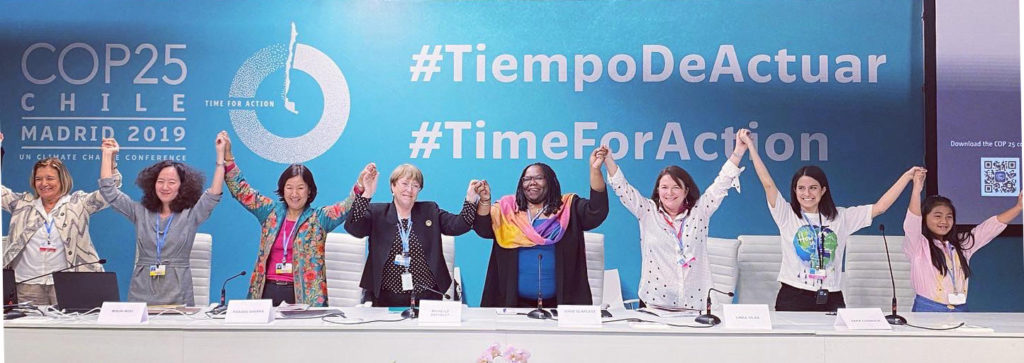
Dec 9, 2019 – CFNU President Linda Silas joins a powerful panel on Climate Crisis and Human Rights at the UN COP25 conference in Madrid. Silas argued for the right of vulnerable people to help define their future.
By Linda Silas, CFNU President
I’ve just returned home from my first-ever climate change conference. And it was a big one! As part of the Canadian labour delegation, I was one of 25 delegates selected by the Canadian Labour Congress (CLC) to attend the largest climate action meeting in the world: COP25 in Madrid, Spain.
Sadly, this COP is widely considered to be a flop. I don’t understand why this historic opportunity was missed, given that the science is clear: we’re in a climate emergency. We must act urgently – certainly in the next few years and with a 2030 global deadline to meet ambitious yet necessary benchmarks.
Canada’s Minister of Environment and Climate Change, the Honourable Jonathan Wilkinson, took the time to meet with me and other members of the Canadian labour delegation. During our discussions, we found common ground on the need for a just transition to help us achieve net-zero greenhouse gas emissions by 2050.
While naysayers will argue that we can’t overhaul our economy to address the threat of climate change, let’s remember that there are no jobs on a dead planet. Commitments toward a just transition ring hollow if they aren’t matched by urgent action by our government. Net-zero emissions by 2050 is a wonderful commitment, but we can’t lose sight of critical short-term targets in the face of such a distant goal. Our window of opportunity to prevent catastrophic climate change is still open, but it’s shrinking fast.
The economic case for an urgent just transition is very compelling, not just for families and communities concerned about their future, but for governments who must implement the large-scale changes required to rapidly transform our society. With thousands of new unionized jobs in a green economy to ensure a fair transition for workers, we can be assured a seat at the decision-making table to help manage the change in a socially responsible way. This was my message during a forum where I had the honour of being a panelist providing a perspective from the labour movement.
The health impacts of climate change are often overlooked – and unfortunately, this was also the case at COP25. As global temperatures rise, wildfires spread pollutants into the air and flood-affected regions increase, we can continue to expect human health to be negatively impacted. Unabated climate change will result in higher rates of heatstroke, cardiorespiratory distress and vector-borne illnesses such as Lyme disease and West Nile virus. And as populations are displaced due to wildfires, droughts and floods, we can also expect an increase in mental health disorders such as PTSD.
The Lancet (a weekly peer-reviewed general medical journal) has characterized climate change as the greatest health threat of the 21st century. As nurses, we also need to frame the issue as a global health threat; we should be educating the public about the many health risks posed by a changing climate, and calling on governments to invest in the necessary personnel and infrastructure to respond to this new public health challenge. Our already cash-strapped health care systems simply aren’t up to the task.
The bottom line: we need to take immediate and aggressive action to meet both short-term and long‑term emissions targets – and we need to get there through a just transition in which no worker is left behind. Both at home and abroad, we must urgently employ a health care lens to ensure that the real-world implications of climate change are addressed. I hope that will be the case at the next COP in 2020.